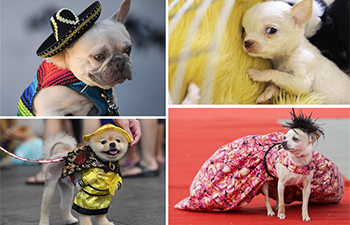by Xinhua writer Cao Bin
BEIJING, Feb. 14 (Xinhua) -- Every dog has its day, and now dogs in China have their year.
The dog comes 11th in the 12-animal Chinese zodiac, following the rooster and preceding the pig. This year of dog commences on Friday.
People born in the Year of Dog are said to be loyal, honest, courageous, industrious and intelligent. But curiously enough, the dog also appears in most Chinese curses describing snobbery, ungratefulness, filth, degradation and promiscuity.
While thousands of sniffer dogs are patrolling train stations and airports during Spring Festival, guide dogs are still frequently denied access to public transportation.
According to the Ministry of Transport, guide dogs should be able to enter any public vehicles by 2020.
Some cannot wait. In December, a Chinese airline company introduced a cabin transport service for pets, which means passengers and their pets now can share the flying experience eye to eye, side by side.
Ride sharing is also burgeoning in China. Car drivers post their departure time, destination and number of vacant seats online, with a statement that pets are acceptable, so that dog owners can share the ride and cost.
Whenever a news story about dog emerges, Chinese people automatically form two teams: dog lovers and dog haters.
Dog does not eat dog, as the idiom goes, but people sometimes do. Eat dogs that is. The Yulin dog meat festival in south China's Guangxi Zhuang Autonomous Region is still held every summer solstice.
On one side of the street, festival goers eat dog meat with lychees and rice wine in the fanciful belief that it will strengthen their physique. On the other side, animal rights activists and dog lovers line up to protest and buy live dogs from butchers to "save" them.
The local government will not issue a ban because the festival is a folk custom, though not officially organized. The festival itself is quieter every year. The bloody scenes of dogs being butchered in the street have disappeared and some stores and restaurants covered the character for dog on their menus.
As Spring Festival approaches, rescue stations in Chinese cities are swarmed with stray dogs. It may be difficult to teach an old dog new tricks, but people keep coming up with new solutions.
Thanks to Tibet's first stray dog adoption center, which opened in late 2013, tens of thousands lucky dogs no longer have to worry the chilly winters on the Qinghai-Tibet Plateau.
Nanchang, capital of east China's Jiangxi Province, launched its first official adoption service for stray dogs recently, aiming to encourage adoption over purchasing.
China's pet dog population has reached 27.4 million, third in the world after the United States and Brazil.
Dogs now have supreme status at home, as reflected by sales of pet products on e-commerce platforms, posts and followers on microblogs and video websites. Even photographers make big bucks by shooting pet dogs for their owners.
Despite some dissenting voices and concerns, service upgrades are an irreversible trend, so is Chinese people's view towards animal rights.
The Year of Dog promises better days for China's dogs.

















